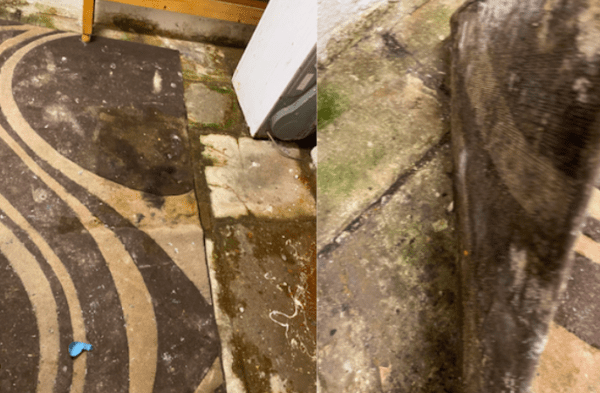Dirty underwear, a broken boiler and £400 in cleaning fees: a laundry list of problems with Thornley Groves

The interviewees in this article have been anonymised with fake names.
Dirty underwear on the floor, a broken boiler for three months and £400 cleaning fees. These are just some of the issues students have faced when renting with Manchester-based lettings agent, Thornley Groves.
A mouldy rug was found in the basement of Warren’s home, a third-year Drama and English student renting with Thornley Groves. Thornley Groves have clarified they fully manage the property, but are “required to gain landlord authorisation for all maintenance expenditure ahead of carrying out works.”
Warren informed us that their basement contains their washer and dryer that are supposed to be used for laundry. However, when they moved in they found it in an unfit state with mould on the wall, a mouldy rug as well as broken appliances. Despite the fact this issue was reported directly to Thornley Groves in September, it was only solved in February this year.
Thornley Groves said they requested permission from the landlord to have the rug removed and for a cleaner to attend the property. The clean was reportedly rejected by the landlord, so Thornley Groves did not approve the rug removal until it was raised again two months later, in November. Thornley Groves claim the contractors were unable to gain access to the property the first three times they tried, so “a contractor was re-instructed on 12/01 and we understand the work took place shortly after this.”

The dirty underwear found in the basement in September is yet to be removed from the property. Warren told us that this made them feel “angry as it would take such little action from them (to fix) but it takes so much from us”.
Thornley Groves said in response “On the inventory prepared for this tenancy, this item is not shown as being present in the basement so has not been flagged as an outstanding item to be resolved with our team.”
Warren emailed Thornley Groves, the property manager, on September 15 2022, saying “there are health hazards in the basement which require immediate attention. Most pressing is the level of damp … I consider this is a health hazard as there is no ventilation in the centre”. It took 4 months after this email for action to be taken.
Thornley Groves said, when referring to the tenants request for the washer/dryer to be removed, “we acknowledge that we could have been more proactive chasing the landlord for approval and we apologise for this.”
Lucy, a second-year Fine Art student detailed how they were forced to live in their accommodation from December to February with no heating. In December, Lucy emailed asking for electric heaters, saying “we have spent more time in this house without heating than we have with it working.”
Their broken boiler was reported in December yet their landlord, Thornley Groves, insisted it was only because the timer clock had been turned off, before sending another plumber out who confirmed it did in fact need replacing, as it was “incredibly old which makes it difficult to properly fix.”
Thornley Groves clarified that their role with this specific property was to be a point of contact for the tenants, passing on details of reported maintenance issues over to the landlord. However, they did acknowledge, “that the boiler was broken for a lengthy period of time and this should have been fixed within days of the initial report”.
Throughout this period the tenants paid a total of £440 on just heating alone, despite living without a boiler, and spent £75 on heaters for the property. Bills were included within rent in this property, meaning money was being taken for heating despite the fact none was being provided. The total of £515 spent has not been refunded to the tenants despite the fact no heating was used in this three-month period.
In February, Thornley Groves confirmed a plumber would begin work to replace the boiler system, as they emailed “Finally, a light at the end of the tunnel!”. Lucy told us how these issues “left us distressed about our health and very worried about how they’d handle future important health and safety issues”.
Thornley Groves said in response that the tenant provided them with a receipt for a £23 electric heater, not for the £75 detailed above, adding, “we did not receive a request for reimbursement but acknowledge that in the circumstances, the tenants should have received a reimbursement of these costs and offer our apologies for this.”
We spoke to Manchester Student Homes who told us the importance of understanding the difference between urgent (broken boiler, no electricity or water etc.) and non-urgent (a leaky tap) repairs. Manchester Student Homes detailed that they would “expect a landlord to investigate [urgent issues] within a 7-day period”, and non-urgent in 28.
Emma, a third-year Law student detailed how they “nearly burnt the house down” due to a faulty thermometer on the oven, which they were not informed of, resulting in oven trays melting. Around Town Flats, who managed the property before Thornley Groves acquired the company in December, did replace the oven straight away. But the tenants were not informed of the faulty appliance, a cause of serious safety concerns for the students living there.

Lucy, a second-year Fine Art Student in a different property told The Mancunion they too had issues with their roof. A storm resulted in a large hole in the roof, causing water to leak into their property. Thornely Groves said in response that this report was passed immediately to the landlord and believe this was dealt with appropriately.

Emma told us that she felt frustrated because “it shouldn’t be that hard to rent a house with an agency and yet they manage to make every part of the process a nightmare.”
Thornley Groves are a Manchester-based estate agent, managing more than 5,500 properties in North, South and Central Manchester. In recent years they have expanded rapidly with the purchase of both Homes4u and Around Town flats, two estate agents who specialised in student accommodation. This has increased their presence in the student housing market, especially over the last three years.
In a response to The Mancunion, Thornley Groves explained they are property managers, not owners and their mandates and authority levels vary with each landlord. With certain properties they have the authority to carry out works up to a certain value without landlord authority, whilst other landlords retain the right to approve any works first or undertake all work themselves.
The level of involvement in reported issues from the company is dependent on both the cost of the repair and the agreed relationship between Thornley Groves and the landlord. This works through an individual owner of a property signing an agreement with Thornley Groves for them to let out and then manage their property. Thornley Grove’s ‘property management’ would then be responsible for noting and reporting maintenance issues to the landlord, whose responsibility would then be to arrange the repairs needed in most cases.
In Emma’s case, Thornley Groves was not the property manager until February 2022, when Thornley Groves acquired ‘Around Town flats’ and took over the management of the property.
The Mancunion has also discovered the difficulties students have faced when trying to get their deposits back after renting with Thornley Groves. On multiple occasions The Mancunion found that students have been charged excessive amounts for “cleaning fees” despite the house being left in a “fit condition” – the legal requirement, as is stated in the Tenant Fees Act 2019. This means it is illegal for an agency to charge for cleaning unless the house is left in a state where professional cleaning is required.
Thornley Groves explained that as agents, they undertake a cleanliness inspection to match the condition of the property at the end of the tenancy with its condition at the start. Adding, “in our capacity as agent, from this we make a recommendation to both the tenant and landlord on the findings of the checkout; the landlord then makes the decision on any claim they feel is due; both landlord and tenant need to reach agreement on this ahead of any amount of the tenant’s deposit being passed to the landlord.”
Lucy told us how they were charged £400 for cleaning. The images used by Thornley Groves’ own report to justify this claim contained no signs of a dirty property and the house was shown to be in a ‘fit condition’. When this claim was challenged by the tenants as part of the ‘reposit scheme’, the charges were found to be incorrect, and the tenants were returned the full £400.
Thornley Groves explained that in this case, the tenants did not pay a deposit for this tenancy but opted for a deposit replacement insurance provided by Reposit. This means that whilst they would have been liable to pay these costs if it had been agreed they were due, there was no money to refund them. Adding, “we believe the proposal made on deductions due was fair”.
The same happened to Emma. Although the house was left in a fit condition, Thornley Groves still attempted to charge them £200 for cleaning. Hence, this student faced challenges getting their deposit back and sent a complaint to the Deposit Protection Scheme (DPS).
After a review from the DPS it was found that out of the disputed £411, £251 should be returned to the tenants and just £160 to the landlord. Of this £160, £150 was awarded for cleaning, £5 for missing items and £5 for damages to a desk chair. Prior to the DPS report, £92 was claimed for the desk chair that was judged by the DPS to cost £20, with just £5 being awarded to the landlord. The total deposit of £507.19 meant that the final amounts awarded to both parties were roughly half each.
Thornley Groves said in response that the check-out report detailed that, “the property is in need of a full clean including deep clean in the kitchen”, meaning the tenants were awarded back only £251.45 of the landlord’s claim of £411.45. The tenants agreed to a £50 cleaning fee to be paid to the landlord at the time of move-out, and then Deposit Protection Scheme awarded the landlord a further £150 for cleaning.
Warren told us how they felt “students’ lack of knowledge on their housing rights” results in them being “taken advantage of by letting agents”. Hence, the University and other local groups aim to aid students who are facing housing difficulties. One of these is the Manchester Student Housing Co-op, or MASH.
MASH’s aim is to “set up a student housing co-op where students own and operate their housing democratically”. This can either be done by buying a house or building a new house from scratch. MASH told us that the aim of this is to “be a supporter of a different model of housing” in order to place control of a home in the hands of people who live there and not an outside influence such as a landlord.
When speaking to two members of MASH about student housing in Manchester, they told us that housing was often “severely unaffordable” resulting in “under-serving people who need housing the most”. MASH also spoke about their own experience regarding the quality of student housing in Manchester, claiming it is very low and there are consistent issues such as damp, poor maintenance, and the quality of the buildings themselves.
We also spoke to Manchester Student Homes the University’s own accommodation service which can assist students with any difficulties related to landlords. Manchester Student Homes told us how it’s important to date maintenance requests and to keep a log of any issues to help iron out any issues students may run into when they receive their deposits back.
Thornley Groves’ parent company, Lomond, added:
“We take out responsibilities as managing agent seriously and always aim to provide a high level of serving working with the mandate provided to us. If the service we provide falls short of what landlord and tenants should expect, we endeavour to resolve issues quickly and professionally. We acknowledge that with the properties you have highlighted, there are instances where we could have been more proactive at times and apologise for this. Equally, I hope our response has also answered some of the queries raised satisfactorily. As part of our commitment to offering a great service, last year, we opened a new branch in Fallowfield solely dealing with student homes, allowing us to provide dedicated personnel. We now manage over 300 student homes and the majority of tenancies run smoothly as supported by a Trustpilot core of 4.3 out of 5.”







